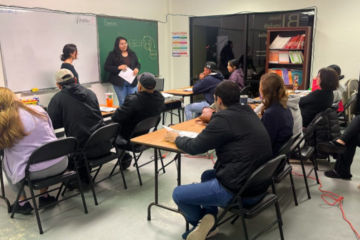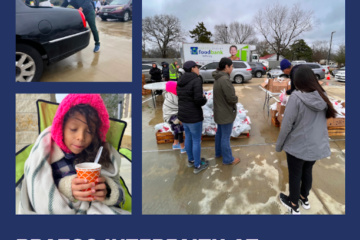How does a non-profit “pivot” in a pandemic? For BIIN, this has meant keeping our focus on the needs of immigrants in our community, while practicing social distancing, to ensure that we do not contribute to the spread of the virus. We are excited to share some of the experiences we have had with adapting different programs to the “new normal,” and some of the lessons we have learned along the way.
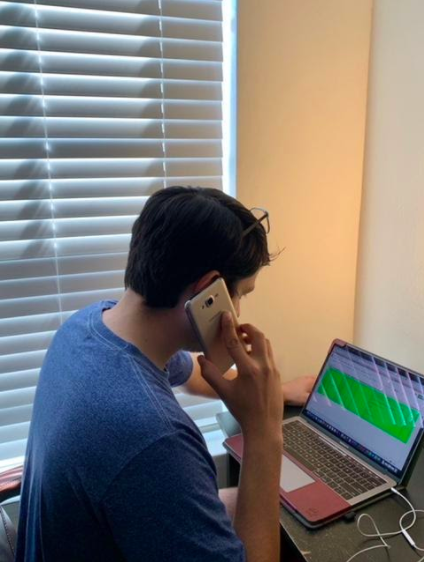
One such pivot is evident in the way that BIIN’s IRA program has continued to provide information, referrals and assistance to members of the community. Instead of dropping by in person, community members have been reaching out by telephone or via messages to BIIN’s Facebook page. Staff members share those messages with long-time volunteer Tony Caraballo, who then finds an IRA volunteer to follow up, by phone or text message. In this way, IRA volunteers have continued to help clients obtain documents, understand procedures, and know where to go for help with rent, medical care, or other needs.
In April and May, volunteer Carlos Espina offered citizenship classes in both English and Spanish through Facebook Live [ https://brazosimmigration.com/volunteer-spotlight-carlos-espina/]. This platform worked well for the citizenship curriculum, because it is centered on a defined set of questions and answers. Using flashcards, Carlos could ask a question on the video and participants could use the chat function to submit answers. Similarly, Facebook Live was used on July 13 for a “Power of Attorney” workshop organized by BIIN. Staff from Lone Star Legal Aid provided in Spanish an overview of the process of creating POA documents. Participants were able to ask questions through the chat or use links provided to download documents or request further assistance.
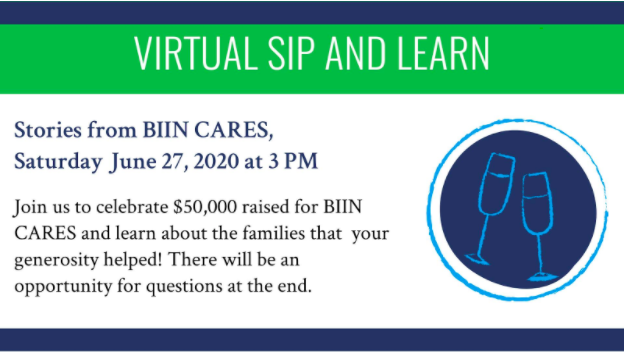
The videoconferencing platform Zoom has also proven to be highly adaptable to BIIN’s needs, and not only for meetings of the board, staff, interns and subcommittees. BIIN hosted its first “Virtual Sip and Learn” through Zoom on June 27. Volunteers Clotilde Pichon and Vivian Bronsoler shared stories and lessons learned in the process of using the BIIN CARES Fund to help local families impacted by COVID-19 pay for rent and utilities bills. Members of the audience used the chat to submit their questions, and board member Esmeralda Casas then voiced those questions at appropriate points in the discussion.
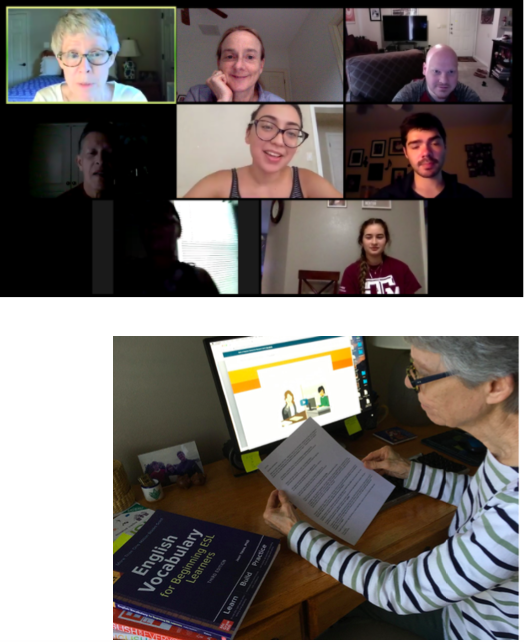
Zoom has also been used to connect with clients through other kinds of programs. Board member and long-time volunteer Susan Dennis has led the way in offering a weekly evening English conversation circle on Zoom. Since late June, a group of adult learners and volunteers has been meeting online on Wednesday evenings, from 6:30 to 8 pm. Susan prepares questions and exercises around an aspect of everyday life that everyone can relate to. For example, at a recent session, participants reviewed vocabulary for common leisure activities before discussing what they like to do, and currently miss doing, because of the pandemic. Depending on the numbers of students and volunteers who show up and the activities planned, Susan may keep the whole group together or divide participants into breakout rooms, to increase opportunities for interaction and practice.
There are of course challenges to teaching in this way. Many participants have only a cell phone, are new to Zoom, and are learning to use it, at the same time as they are dealing with other potential distractions (inconsistent internet connections, young children or others in home spaces, or even hearing or vision limitations that have become more of an issue in online communication). But the warmth and patience demonstrated by Susan, her fellow volunteers, and other participants go a long way towards making everyone feel welcome. With this kind of gathering, it really helps to have multiple volunteers: not only native English and bilingual speakers, but also people with technical skills who can help individuals log on or stay connected, while the rest of the group goes ahead with the lesson planned.

Zoom has also proved useful to piloting a family literacy program this summer. The basic premise of any family literacy program is that reading and talking about reading, in any language, brings multiple benefits to children and adults. To build these habits, while practicing social distancing, required multiple digital tools and a willingness to experiment. BIIN staffer Janet Morford, who led the program, found willing partners among families with elementary-school-aged children that she knew from having volunteered with BIIN’s English for Parents program. For five weeks, participants met one morning a week by Zoom, and spent time chatting, reading together, and modeling and talking about specific strategies. Parents and kids were asked to set goals for daily reading and to keep a reading log.
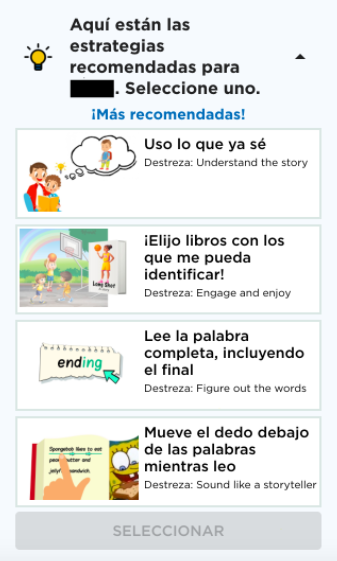
To get started, parents had to download the Zoom app and become comfortable with using it (on phones). We used texts and emails to agree on meeting times, send instructions and communicate between sessions. Language translation apps were also valuable tools, as none of the adults were fully bilingual. A couple of online assessments helped clarify what level of books each child was ready for, and helped families identify specific goals to work on, such as “deciphering words” or “understanding the story.” We also used the resources of Springboard Collaborative, a non-profit based in Philadelphia that has created an app that sends targeted daily texts – in Spanish or English — to remind parents of ways to work with their kids with reading, as well as short videos about how parents can coach young readers.
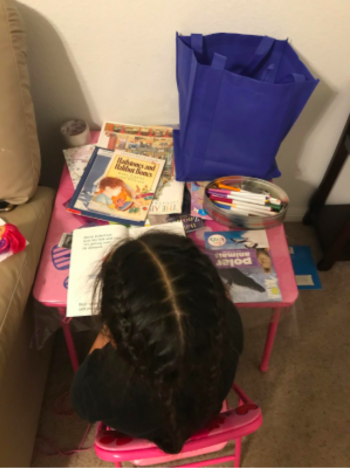
The initial plan was to encourage families to use the public library to borrow books. After this proved to be difficult in some cases, BIIN reached out to “Books and a Blanket,” a local initiative which very generously provided bags of new and gently used books to match the age and interests of each young participant. You can imagine the excitement when a bag full of books appeared on a family’s doorstep! We also discovered some collections of free online books, which made it easier to read together from a shared screen during Zoom meetings.
A few lessons have emerged both from the online conversation circle and the family literacy pilot:
• It takes time to teach technical skills as well as language skills, and it can be tricky to do both together online (especially if an instructor is not bilingual). But both are important in today’s world, and it’s an effort worth making, for the sake of expanding our clients’ capabilities.
• To run online programs, it really helps to have multiple volunteers, especially when working with groups of people who have very different skills and needs. Sometimes, you need someone to take charge of a specific technical task, so that the rest of the program can keep going, if participants need help getting into the meeting or staying connected. Online programs also require lots of on-going communications (by text, email, etc.) outside of meetings.
• Even when we meet online, it is important to get to know one another as individuals, to build a sense of community and mutual recognition. People show up not only to learn skills, but also to be in community, and having volunteers who are willing to build connections with clients is just as crucial online as it is in in-person programs.
• Access to reliable internet, digital devices, book-borrowing privileges, and other ways of getting good information are issues of equity. We need to continue to look for ways to increase access to these resources for everyone in our community.
If you are interested in volunteering with any of these programs, or have ideas about other ways that we can use digital technologies (or other tools) to support people in our community at this time, please let us know! You can reach Jaimi Washburn at info@brazosimmigration.com and/or Janet Morford at janet@brazosimmigration.com .
